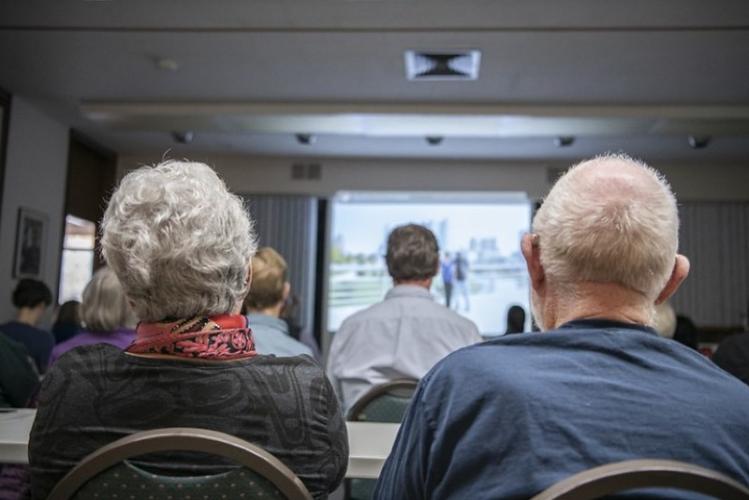
Ohio University's Voinovich School of Leadership and Public Service Joins Forces with Ohio State University's College of Social Work to Create the 'Grey Green Alliance'

Ohio University’s Voinovich School of Leadership and Public Service, working in collaboration with The Ohio State University’s College of Social Work, has created the Grey Green Alliance to research and develop sustainability and climate resilience concepts for older adults.
The idea for the Grey Green Alliance, or GGA, came to siblings, Geoff Dabelko and Holly Dabelko- Schoeny, at the family dinner table. This discussion between Geoff Dabelko, a professor and associate dean at the Voinovich School, and sister Holly Dabelko-Schoeny, an associate professor at the The Ohio State College of Social Work and director of research for the Age-Friendly Innovation Center in Columbus, laid the groundwork for the collaboration between the siblings and their respective universities.
“For decades, we thought we could never find a way to work together until we were literally kind of sitting around the Thanksgiving dinner table,” Geoff Dabelko said. “Suddenly, we saw the kind of potential synergies.”
The potential partnership grew out of an age-friendly communities process set up by the World Health Organization, or WHO, and organized nationally by the AARP. The 14-year-old method allows communities to enter a five-year process to create communities that are livable for people of all ages.
Columbus officially joined the international network and in 2016, the five-year cycle began. Katie White, director of the Age Friendly Innovation Center at Ohio State's College of Social Work and director of Age Friendly Columbus and Franklin County, described the initiative as a commitment from communities to understand areas of need and opportunity for improving communities for older adults and people with disabilities.
“I think the Grey Green Alliance is a really good example of the evolution of Age Friendly work and how you get into it,” White said. “You start to see success and as you start to understand your assessment results and get into your strategic planning work, you start to see other areas that could and should be involved.”
When Ohio University’s Dabelko brought this work to the Voinovich School, research students in the school took a special interest in the topic. Melissa Damico, a fourth-year Voinovich undergraduate research scholar at Voinovich School and Ohio University's Honors Tutorial College environmental studies student, has been heavily involved in the GGA from Ohio University and Athens.
The summer after her freshman year, Damico was selected for an Honors Tutorial College Apprenticeship that allowed her to conduct research in Columbus and Franklin County, a city and county undergoing the five-year process, and observe their emergency preparedness, especially in regard to climate change.
She was embedded at the Age-Friendly Columbus and Franklin County municipal office in a City of Columbus recreation center where she could learn directly from the older adults, or “experience experts,” and the faculty and staff working in the community. When she returned from Columbus, Damico used her research to help bring the age-friendly process to Athens.
What Dabelko noticed during this time in the WHO’s age-friendly method was that sustainability and climate resilience were not considered among its eight focus areas.
His sister, Dabelko-Schoeny, shared with him how The Ohio State’s College of Social Work was going through the age-friendly process in Columbus and Franklin County, with its focus on transportation, infrastructure and housing. “But, she didn't see how I fit in with climate issues,” Dabelko said. “I said, ‘If climate mitigation is about reducing emissions, that's in the transportation sector, the housing sector and the infrastructure.’”
Using the research previously completed in Columbus and the age-friendly process there, Dabelko introduced the idea for the Grey Green Alliance in 2019. The following fall, Ohio University invited Dabelko-Schoeny and White from the Columbus project to talk with some of the Athens community members.
“They were really enthusiastic about making Athens an age-friendly community as well,” said Damico, the Voinovich scholar. “Specifically Athens’ older adults expressed concern about the climate dimension of my research, so we added a nice domain called sustainability and climate resilience.”
The Age-Friendly Athens County Initiative is still in the early stages of development within the five-year development process. Rebecca Miller, the senior director of community relations for Ohio University’s College of Health Sciences and Professions as well as a leader in the Age-Friendly Athens County Initiative, said the first portion of the work from this past summer was to send out a community survey across the county.
“The first two years [of the process] are a community assessment,” Miller said. “We're at this point where we're just kind of awaiting results for our next steps.”
Rebecca Miller, along with Sam Crowl, an Athens City Council member, emphasized the importance of getting members of the Athens community to fill out the comprehensive survey so they can obtain the most accurate survey results possible. The results will be used to enter the next stages of the age-friendly process.
Community members are encouraged to share their priorities with the Age-Friendly Athens County Initiative leadership and all volunteers are welcome on any of the domain committees.
Through the Age-Friendly Athens County Initiative and other processes, Dabelko and Damico hope to continue their research into sustainability and climate resilience on the local, state and international levels.
“I appreciate Dr. Dabelko’s research group. There have been a number of terrific students throughout the years he's been at Ohio University who have come out of that group looking at sustainability and certainly applied resilience,” Crowl said. “I look forward to hearing more about the Grey Green Alliance and [Damico] compiling some of her research conclusions about how that project can continue to go forward.”
